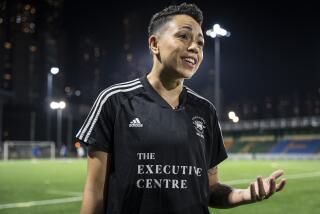Well-Off Ethnic Minorities Fret Over Fate in Hong Kong
- Share via
HONG KONG — In most other countries, Vera Ruttonjee-Desai would undoubtedly be the object of considerable envy. Her family is not only respected and prosperous but counts a couple of Hong Kong’s most famous skyscrapers in its real estate portfolio.
Born and raised in the lap of luxury in this British colony, she nonetheless wrings her hands with worry during an interview and complains that she is “in a real predicament about the future.”
Ruttonjee-Desai is among a group of ethnic minorities primarily of Indian descent who look toward 1997, when control of Hong Kong will revert to China, with increasing anxiety.
China has said that the ethnic minorities, unlike the territory’s 5.6 million ethnic Chinese, will not be considered Chinese citizens. Britain, the colonial power in Hong Kong, refuses to grant them British citizenship. India politely adds that it is Britain’s problem.
“We’re neither Chinese nor British,” Ruttonjee-Desai said. “After 1997, we’ll become stateless.”
But these are stateless people with an ironic twist. Most of the 10,000 people of Indian, Pakistani and mixed European and Asian heritage are prosperous. They include a number of prominent millionaires, indeed some of Asia’s wealthiest entrepreneurs, which makes it difficult to whip up sympathy for them.
“They are the last remnants of the British Empire,” remarked an English lawyer who follows immigration issues. “The problem is they are all so rich they won’t have much trouble settling in the United States or Canada.”
Hari Harilela, president of the Hong Kong Indian Assns., owns a string of Holiday Inn hotels stretching from Bangkok to Stamford, Conn., and presumably could easily qualify for residency in America. But he believes that Britain has a moral obligation to provide for its former colonial subjects.
“I personally feel they are being racist,” Harilela said. “They are giving British passports to 70,000 people in Gibraltar, even the residents of the Falkland Islands.”
Many of the minorities in Hong Kong came here while India, then including what is now Pakistan and Bangladesh, also was under British colonial rule; they or their forebears took an oath to the queen of England. All speak English, and a significant proportion are fluent in Cantonese, the dominant Chinese dialect in Hong Kong; some do not speak their native language. Kewlram Sital, chairman of the Council of Indian Assns., said his group estimates that Indian businessmen account for 10% of Hong Kong’s foreign trade, despite being only a tiny fraction of the population.
Sital, who owns a construction company in Bombay, notes that even now, with his British Dependent Territory Citizen passport, he needs a visa to visit India and is thoroughly quizzed when he tries to enter Britain.
In 1997, while ethnic Chinese will be given Chinese passports, the minorities will be issued British Nationality passports, which carry no right of abode anywhere, not even in Hong Kong. As a result, Sital said, many governments will be reluctant to give them so much as a tourist visa because there will be no country to which to deport them if things go awry.
The British government announced in December that it would grant full citizenship to 50,000 households in Hong Kong, using a point system to award passports to a total of about 225,000 persons based on their service to the territory. It was hoped that these key families would include some of the ethnic minorities, who would thus be enticed to stay on in Hong Kong with their futures secured.
But Beijing cast a pall over even this concession by describing the program as interference in China’s internal affairs and announcing that most senior Hong Kong officials will be forced to step down if they accept foreign passports or residency.
More to Read
Sign up for Essential California
The most important California stories and recommendations in your inbox every morning.
You may occasionally receive promotional content from the Los Angeles Times.












